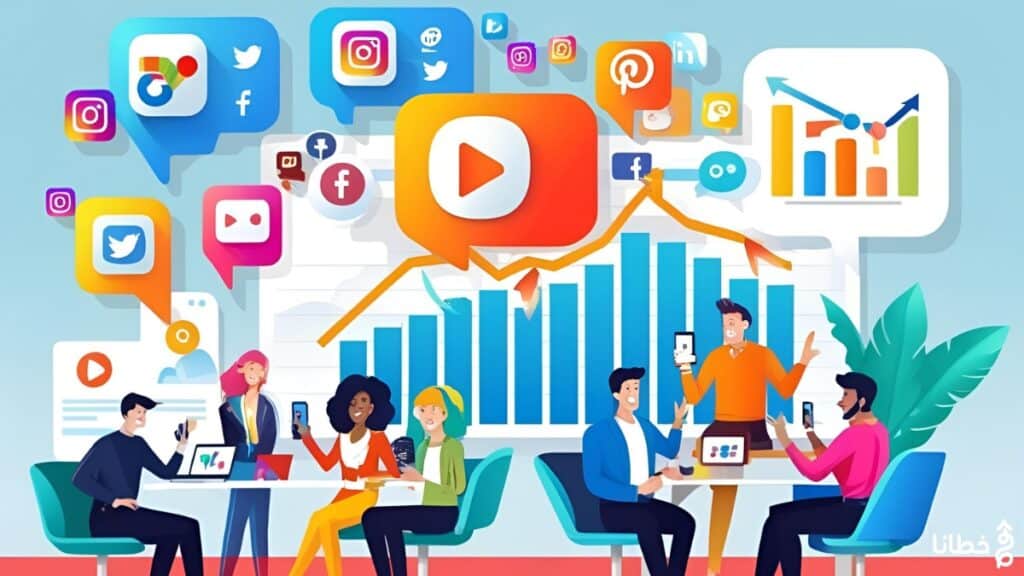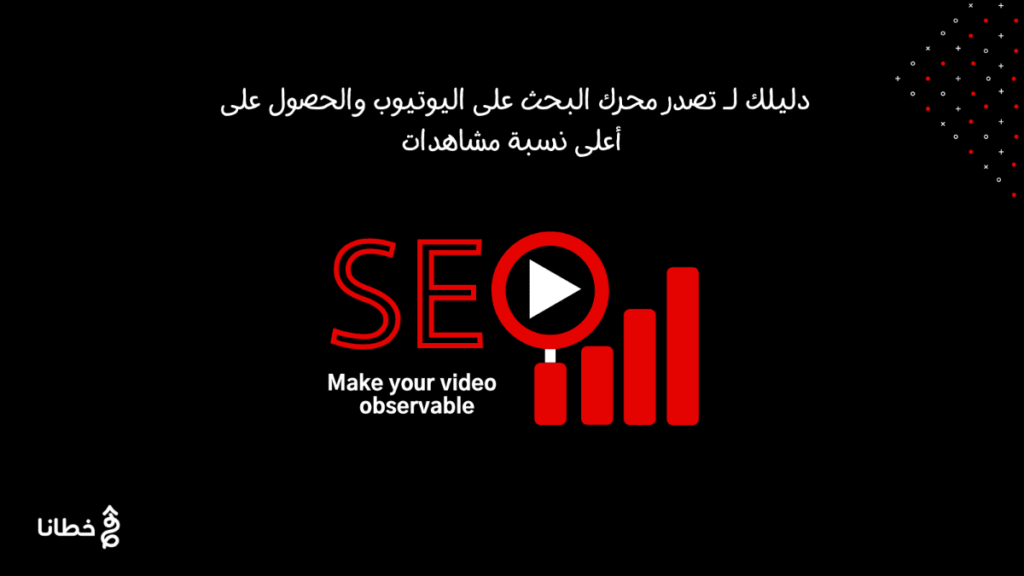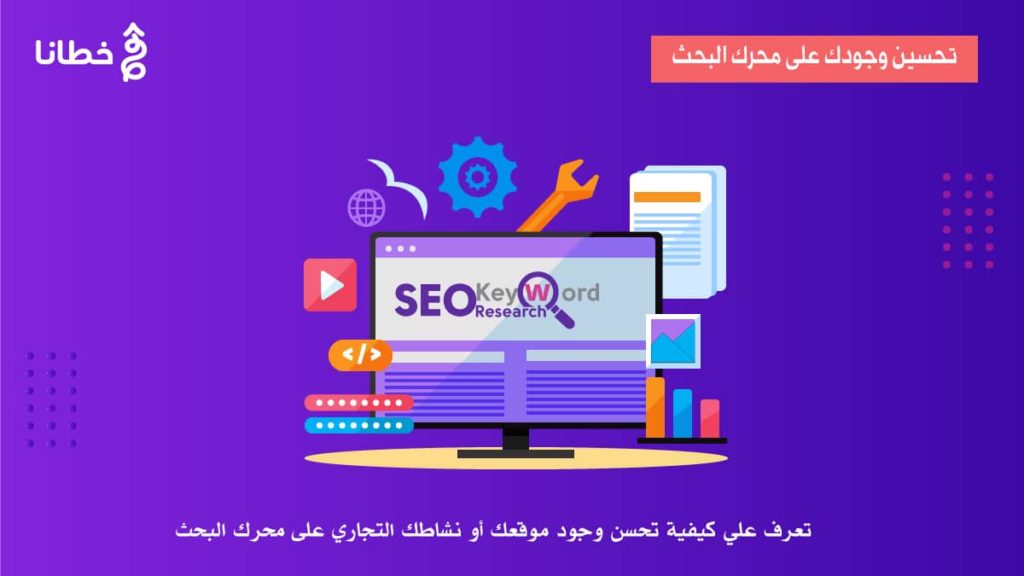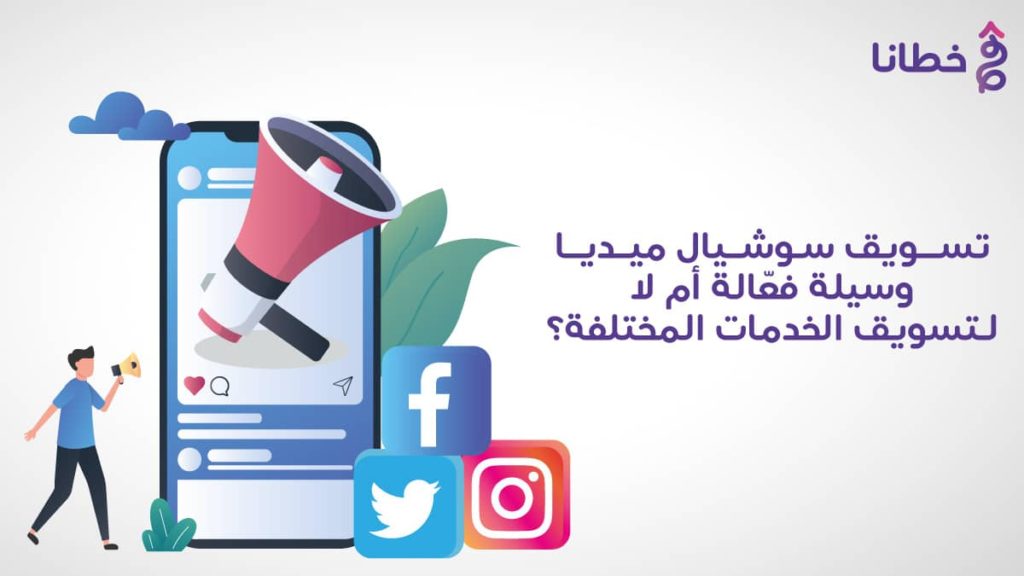table of contents
Digital marketing is the use of the Internet and digital technology to promote products or services and build relationships with target audiences. Its main goal is to reach potential customers and convert them into actual customers using various tools and techniques such as social media, email, and data analysis. Digital marketing helps companies communicate directly with customers, and provides them with the opportunity to measure the impact of marketing campaigns instantly and adjust them as needed. This makes digital marketing more effective and transparent compared to traditional marketing.
What is e-marketing?
Digital marketing is the use of the Internet and digital technology to promote products or services and build relationships with target audiences. Simply put, it is any type of marketing that is done online or using electronic devices.
Digital marketing includes many things such as:
- Search Engine Optimization (SEO): Optimizing your site so that it appears in the first search results.
- Social media marketing: Using platforms like Facebook, Instagram, and Twitter to connect with your audience.
- Content Marketing: Creating valuable content such as articles and videos to engage your audience.
- Pay-per-click (PPC) advertising: Pay for each click on your ad like Google Ads.
- Email Marketing: Send promotional messages to customers via email.
Digital marketing helps businesses reach a larger audience in more effective ways and at a lower cost compared to traditional marketing.
What is the difference between digital marketing and e-marketing?
Digital marketing is an umbrella term that includes all types of marketing that use digital technology. It means not just the internet, but also television, radio, and SMS. Anything that uses digital technology to promote products or services falls under digital marketing.
Internet marketing is a part of digital marketing, but it focuses more on the use of the Internet specifically. That means all activities that take place over the Internet such as email marketing, search engine optimization (SEO), social media marketing, and paid online advertising fall under Internet marketing.
In other words, all e-marketing is digital marketing, but not all digital marketing is e-marketing. Digital marketing is broader, while e-marketing is focused on the Internet only.
What does a digital marketer do?
A digital marketer performs a variety of tasks that help promote products or services online and through digital technology. Let me explain some of the basic tasks he performs:
- Market and target audience analysis: The digital marketer starts by understanding the market and target audience by analyzing data and statistics.
- Search Engine Optimization (SEO): It works on improving the company’s website so that it appears in the first search results on Google and other search engines.
- Managing advertising campaigns: Creates and manages advertising campaigns on platforms such as Google AdWords and Facebook Ads, monitors the performance of these campaigns, and adjusts them as needed.
- Social media marketing: Using platforms like Facebook, Instagram, Twitter, and LinkedIn to engage with your audience and post promotional content.
- Content Creation: Writes articles, blogs, videos, and social media posts to attract audiences and increase engagement.
- Email Marketing: It sends promotional messages to current and potential customers, and tracks the performance of these campaigns.
- Data analysis: It uses data analysis tools such as Google Analytics to track the performance of the website and marketing campaigns, and uses this data to improve marketing strategies.
- Collaborate with other teams: Collaborate with design, sales, and customer service teams to ensure coordination of efforts and achievement of marketing goals.
A digital marketer must have analytical and creative skills, and be able to adapt to rapid changes in technology and the market.
Where and how do I learn digital marketing?
Learning digital marketing can be fun and very useful, especially if you have the passion and desire to develop. There are many sources that you can start from, whether free or paid courses, articles, videos, or even podcasts. Let me tell you about some ways and sources that can help you, my friend:
Free online courses
- Skills from Google: Google offers a free comprehensive course on the basics of digital marketing, and you get a certified certificate after completing the course.
- HubSpot Academy: Offers free courses in inbound marketing and social media marketing.
- Coursera and Udemy: There are many courses on both platforms, some free and some paid, covering all aspects of digital marketing.
YouTube videos
- Walid Taha’s channel: He has an excellent series of videos about digital marketing for beginners.
- Growth Hack Academy: They provide comprehensive educational videos on digital marketing.
Articles and blogs
- Khutana Blog for Electronic Marketing: It provides all electronic marketing services, and it has excellent articles on electronic marketing; it will be very useful to you.
- Nafezly Blog: It contains many articles about the best sources for learning digital marketing for free.
- Winners: They provide a comprehensive guide to the best digital marketing courses from scratch to professionalism.
Podcast
- There are many podcasts that talk about digital marketing, such as: Marketing Over Coffee and The Digital Marketing Podcast.
Is digital marketing profitable?
Yes, digital marketing can be very profitable, but it depends on many factors such as the strategy you use, the target market, and the products or services you promote. Let me explain some important points:
- Lower cost: Digital marketing is usually less expensive than traditional marketing, which allows small and medium-sized businesses to compete effectively.
- Reach a larger audience: The Internet allows you to reach a global audience, which opens up new opportunities to increase sales.
- Performance measurement: You can monitor the performance of your marketing campaigns instantly and adjust them as needed, which increases the effectiveness of the campaigns.
- Direct interaction: Social media and email allow you to interact with customers directly, which helps build strong relationships and increase brand loyalty.
- Customization: You can customize marketing messages based on customer interests and behaviors, which increases conversion opportunities.
But you should keep in mind that success in digital marketing requires good planning, a deep understanding of the market and audience, and the use of appropriate tools and techniques. Also, you should be prepared to continuously learn and adapt to rapid changes in technology and the market.
What is the future of digital marketing?
The future of digital marketing is very promising and full of exciting developments. Let me tell you about some of the trends that will shape the future of digital marketing in the coming years:

1- Artificial Intelligence and Machine Learning:
- Personalization of the experience: AI will be able to analyze huge amounts of data to understand consumer preferences and behaviors, which will help in creating highly personalized marketing experiences.
- Automation: Automation tools take care of routine tasks like content creation, email marketing, and customer service, allowing marketers to focus on strategy and creativity.
- Predictive Analytics: AI will help predict consumer trends and behaviors, enabling more effective targeting and campaign optimization.
2- Voice search and smart assistants:
- Optimize Voice Search: With the increasing use of smart speakers and voice assistants like Alexa and Sir, optimizing content for voice search will remain essential.
- Conversational Marketing: Marketers use voice-activated devices to interact with consumers through conversational interfaces.
3- Augmented Reality (AR) and Virtual Reality (VR):
- Immerse Experiences: AR and VR provide immersive experiences that allow consumers to interact with products in a virtual environment, increasing engagement and purchase intent.
- Virtual showrooms: Retailers are using VR to create virtual showrooms, allowing customers to explore and try on products from their homes.
4- Blockchain technology:
- Transparency and Trust: Blockchain will enhance transparency in digital advertising by providing verifiable tracking of ads and preventing ad fraud.
- Decentralized platforms: Blockchain-based platforms will give consumers more control over their data and how it is used by marketers.
5- The development of content marketing:
- Interactive Content: Interactive content such as quizzes, polls, and interactive videos will continue to be more popular to actively engage users.
- Video Dominance: Video content, including live streaming and short videos, will continue to dominate, driven by platforms like TikTok, YouTube, and Instagram.
6- Social commerce:
- Integrated Shopping: Social media platforms will integrate more commerce capabilities, allowing users to shop directly within apps.
- Influencer Marketing: Partnering with influencers who align with your brand values and goodwill boosts your reach and credibility.
The future of digital marketing will have many challenges and opportunities, and in order to keep up with these developments, you must always be aware of the latest trends and technologies.
What are the functions of digital marketing?
Digital marketing jobs are very diverse and cover many areas. Let me tell you about some of the basic jobs that you can find in this field:
1- Search Engine Optimization (SEO) Specialist:
- It improves the site’s ranking in search engine results such as Google.
- It uses techniques such as keywords, link building, and content optimization.
2- Social Media Manager:
- Plans and implements marketing strategies on social media platforms.
- It monitors audience interaction and analyzes campaign performance.
3- Content Marketing Specialist:
- Writes and edits content such as articles, blogs, and videos to engage an audience.
- Creates valuable and useful content that enhances brand presence.
4- PPC Campaign Manager:
- Manages paid advertising campaigns on platforms such as Google AdWords and Facebook Ads.
- Monitors the performance of ads and adjusts them to achieve the best results.
5- Email Marketing Specialist:
- Designs and implements email campaigns to communicate with customers.
- It tracks campaign performance and analyzes data to improve results.
6- Data Analyst:
- Analyzes data collected by marketing campaigns to understand audience behavior.
- This data is used to develop more effective marketing strategies.
7- E-commerce Manager:
- Oversees online business operations, such as managing online stores.
- It works to improve user experience and increase sales.
8- Marketing Automation Specialist:
- Uses automation tools to simplify marketing processes such as sending automated emails.
- Analyzes automation performance and adjusts it to improve efficiency.
These jobs require different skills such as analysis, creativity, and communication, and provide great opportunities for development and growth in the field.
What is the easiest type of digital marketing?
The easiest types of digital marketing may vary depending on your skills and interests, but some types are a good start for beginners:
1- Social Media Marketing:
- Ease of use: Most people already use platforms like Facebook, Instagram, and Twitter, so it’s easy to start marketing on them.
- Direct interaction: You can interact with your audience directly and quickly, which helps you understand their needs and preferences.
2- Email Marketing:
- Low cost: Free and paid tools make it easy to create and manage email campaigns.
- Highly effective: Email is one of the most effective channels for converting potential customers into actual customers.
3- Content Marketing:
- Creative and fun: If you love writing or creating videos, content marketing will be fun for you.
- Building Trust: Good content helps build trust with your audience and increase brand awareness.
4- Search Engine Optimization (SEO):
- Long-term results: Optimizing your site for search engines helps you get consistent traffic at no additional cost.
- Continuous learning: Many free resources help you learn the basics of SEO.
What are digital marketing tools?
Digital marketing tools help marketers effectively implement, analyze and improve their marketing campaigns. There are many tools that cover different aspects of digital marketing, and let me tell you about some of the basic tools that you may need:
1- Search Engine Optimization (SEO) Tools:
- Google Search Console: A free tool from Google that helps you monitor your site’s performance in search results and identify technical issues that may affect its ranking.
- Ahrefs: A powerful tool for analyzing backlinks and keywords, helping you improve your site’s ranking.
- SEMrush: Provides a comprehensive suite of tools for competitor analysis, keywords, and SEO.
2- Email marketing tools:
- Mailchimp: A popular tool for creating and managing email campaigns, with detailed reporting on campaign performance.
- GetResponse: Combines email marketing and automation tools, helping you create personalized campaigns.
3- Social media marketing tools:
- Hootsuite: Helps you manage and schedule posts on different social media platforms from one place.
- Buffer: Another tool for managing and scheduling posts, and providing analytics on content performance.
4- Data analysis tools:
- Google Analytics: A free tool from Google that helps you track and analyze traffic to your website, and understand visitor behavior https://analytics.google.com/analytics/web.
- Hotjar: Provides visual analytics like heatmaps and visitor logs, which helps you understand how users interact with your site.
5- Content creation tools:
- Canva: An easy-to-use tool for designing images and graphics, with ready-made templates for marketing content.
- Adobe Spark: Helps you easily create engaging videos and photos.
6- Project management tools:
- Trello: A tool for managing and organizing tasks and projects, and helps you collaborate with your team.
- Asana: Provides advanced project management and progress tracking features.
These tools will help you improve the efficiency of your marketing campaigns and increase your productivity.
Advantages and disadvantages of digital marketing
Advantages of digital marketing:
- Reach a wider audience: You can easily reach a global audience, which opens up new opportunities to increase sales.
- Lower cost: Digital marketing is usually less expensive than traditional marketing, which allows small and medium-sized businesses to compete effectively.
- Performance measurement: You can track the performance of your marketing campaigns in real-time and adjust them as needed using data analysis tools.
- Direct interaction: Social media and email allow you to interact with customers directly, which helps build strong relationships and increase brand loyalty.
- Customization: You can customize marketing messages based on customers’ interests and behaviors, which increases conversion opportunities.
Disadvantages of digital marketing:
- Market saturation: With the increasing number of companies using digital marketing, the competition is fierce and it is difficult to stand out from the competition.
- Relying on technology: Digital marketing relies heavily on technology, and this can cause problems if there are technical glitches or security breaches.
- Lack of personal interaction: Although you interact with customers online, there is less personal interaction that occurs in traditional marketing.
- Fraud Risks: Some companies face the risk of fraud and cyber fraud, and this requires strong security precautions.
- Continuous development: Digital marketing is changing rapidly, and this requires constant monitoring and new learning to keep up with developments.
Tips to overcome market saturation:
Market saturation can be a big challenge, but some strategies can help you overcome it and stand out from the competition. Let me tell you some important tips:
- Competitor Analysis: Understand what your competitors offer and how they attract customers. This will help you know their strengths and weaknesses and exploit them to your advantage.
- Create a niche: Try to find a specific segment of the market that you can target with customized products or services. Niche helps you focus your marketing efforts and build a loyal customer base.
- Effectively price products: Review your prices and make sure they are competitive and appropriate for the quality of the product or service you provide. Effective pricing can be a powerful factor in attracting customers.
- Innovation and diversity: Offer new and innovative products or services that better meet customer needs. Diversifying your offerings helps you attract new customers and retain existing ones.
- Improve customer service: Excellent customer service can be a powerful differentiator. Make sure you deliver a positive customer experience with every interaction, and this will build strong brand loyalty.
- Add value: Try to add extra value to your products or services, whether through additional features, educational content, or special offers. Added value attracts customers and makes them prefer your brand.
- Creative Marketing: Use innovative and engaging marketing strategies that make your brand stand out. Creative marketing helps you stand out in a crowded market.
- Focus on quality: Make sure your products or services are of high quality. Quality builds a strong reputation and attracts customers who are looking for the best.
Following these tips can help you overcome market saturation and achieve greater success, andthere are companies that provide marketing consultations and effective strategies in the world of online marketing, the most important of which is Khutana E-Marketing Company.
Discover more articles:
Email marketing with 3 steps for email marketing campaigns
Search Engine Optimization SEO with 3 sets of toolsOptimization
Your 5-Step Guide to Creating a Successful Blog in 5 Steps
Question about the digital marketing article: The 7 most important ways to succeed in the world of digital marketing
What exactly does digital marketing do?
The scope of a digital marketer’s role includes a wide range of digital media, including social media, search engines, email, content creation, and online advertising. Their primary goal is to connect with target audiences, drive engagement, and achieve business goals through digital means.
How do I start digital marketing?
To get into digital marketing, gain relevant skills through online courses, certifications, or degree programs. Gain practical experience through internships or freelancing. Build a strong online presence, network with industry professionals, and create a portfolio that showcases your expertise.
Is digital marketing a good career?
Definitely! Digital marketing remains an excellent career choice for the future. The industry is rapidly expanding, offering diverse opportunities, remote work options, and continuous learning. The demand for skilled digital marketers remains high as companies focus on online presence and marketing efforts.
Is digital marketing halal?
Digital marketing can be applied from an Islamic perspective, but its application must be consistent with the values contained in the Quran and Sunnah. In other words, digital marketing has a place from an Islamic perspective, but the requirements of Islamic law must be adhered to.
We respect and value your time... Half an hour to grow your project





